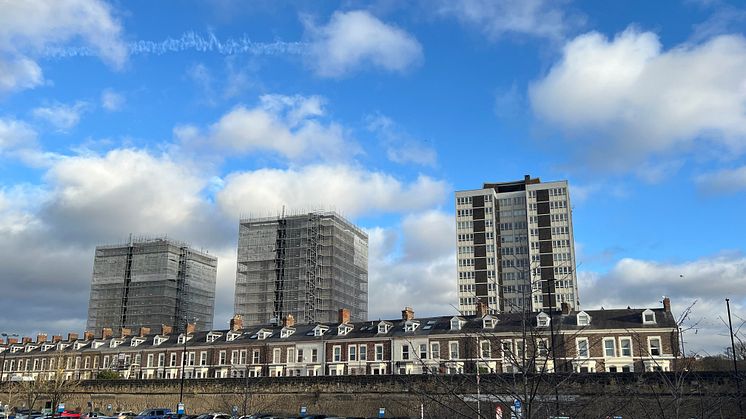
Press release -
Can energy saving improvements make your home less healthy?
Rising gas and electricity bills have led to many householders trying to make their homes more energy efficient in recent years by adding insulation and sealing windows and doors, but can this have an unintended impact on their health?
Access to fresh air in homes is hugely important – it removes pollutants in the air from cooking, cleaning products and burning fuel and reduces moisture which can cause mould – improving the indoor air quality and making our homes healthier to live in. This is especially important for people with lung conditions, including asthma and bronchitis.
However, making homes more energy efficient can also impact on ventilation and reduce the amount of fresh air being circulated indoors, putting people with existing health issues at risk.
Now a team of researchers, led by Northumbria University, are set to investigate the impact of retrofitting houses to make them more energy efficient on the health and wellbeing of residents in Newcastle.
The National Institute for Health and Care Research has awarded the team £680,000 to run the three-year In2Air study to better understand the impact of energy efficiency improvements on homes.
The research team, which includes collaboration with Newcastle City Council, Newcastle University and the London School of Hygiene and Tropical Medicine, have already worked with Newcastle City Council to collect data on 30 single-story terraced homes in the city which are due to have energy efficiency improvement works carried out.
The funding will allow them to expand their existing study to include a further 60 homes, to include blocks of flats and other building types, including Lort House, Pandon Court and King Charles House in Shieldfield, Newcastle (pictured).
The air quality both inside and around the houses will be carefully measured before building works begin, and again up to 12 months after building works have been completed, to analyse any changes.
Professor Jane Entwistle, Interim Pro-Vice-Chancellor for the Faculty of Engineering and Environment at Northumbria University, is leading the study. She explained: “Air pollution is one of the main causes of ill health and early death worldwide. Our homes need fresh air to be healthy and comfortable, however, retrofitting older buildings to make them more energy efficient can reduce ventilation which impacts on the amount of fresh air available indoors.
“We want to find out how making social housing more energy efficient affects both the indoor air quality and the health and wellbeing of those living there.”
Dr Michael Deary, Associate Professor in the Department of Geography and Environmental Sciences at Northumbria University, and co-investigator on In2Air commented: “By evaluating the changes resulting from the retrofitting works we hope to be able to assess the impact of net zero household energy interventions. From there we can shape advice for councils and residents to ensure that we also improve indoor air quality when we make homes more energy efficient in the future.”
Cllr Paula Maines, Cabinet Member for Housing at Newcastle City Council, said: “Our Net Zero vision is to see Newcastle not be a net contributor to climate change by 2030. We have been working across the city to establish a partnership-based approach drawing in other public sector organisations, businesses, residents and stakeholders to set out a collective understanding of our emission profiles, the scale of the decarbonisation challenge and an action-based path to a Net Zero future.
“This research project will enable us to better understand the home environment and the needs of our residents, helping us to continue to refine and improve the measures installed to ensure that our residents gain the greatest benefits from the retrofit works.”
Cllr Maines added: “Our ambitions include supporting the retrofit of all homes through improved insulation, low carbon heating and solar photovoltaic panels. We aim to reduce energy demand, provide more efficient heating systems and improve the thermal comfort for our residents.”
The research team hope that the study findings and the protocols they develop will support and inform council retrofit teams across the UK with decision-making on their ongoing decarbonisation plans.
More information about the In2Air study is available on the project website.
Topics
Categories
UNIVERSITY OF THE YEAR 2022 (Times Higher Education Awards)
Northumbria is a research-intensive university that unlocks potential for all, changing lives regionally, nationally and internationally.
Two thirds of Northumbria's undergraduate students come from the North East region and go into employment in the region when they graduate, demonstrating Northumbria's significant contribution to social mobility and levelling up in the North East of England.
Find out more about us at www.northumbria.ac.uk
--- Please contact media.communications@northumbria.ac.uk with any media enquiries or interview requests ---
NIHR
The mission of the National Institute for Health and Care Research (NIHR) is to improve the health and wealth of the nation through research. We do this by:
· Funding high quality, timely research that benefits the NHS, public health and social care;
· Investing in world-class expertise, facilities and a skilled delivery workforce to translate discoveries into improved treatments and services;
· Partnering with patients, service users, carers and communities, improving the relevance, quality and impact of our research;
· Attracting, training and supporting the best researchers to tackle complex health and social care challenges;
· Collaborating with other public funders, charities and industry to help shape a cohesive and globally competitive research system;
· Funding applied global health research and training to meet the needs of the poorest people in low and middle income countries.
NIHR is funded by the Department of Health and Social Care. Its work in low and middle income countries is principally funded through UK Aid from the UK government.








